
Kim Moon-soo is a South Korean politician currently serving as the current Chairperson of the Economic, Social and Labor Council (ESLC) of the Republic of Korea from September 30, 2022. Previously, he was the 32nd Governor of Gyeonggi Province in South Korea. A former labor activist, he began his career in politics when he participated in the foundation of the People's Party in 1990. He was elected to the 15th National Assembly at Sosa-gu, Bucheon, as a candidate for the New Korea Party. After continuing to serve as a member of the assembly in the 16th and the 17th National Assemblies, he became the 4th Governor of Gyeonggi Province to be elected by popular vote in 2006.

Presidential elections were held in South Korea on 18 December 1997. The result was a victory for opposition candidate Kim Dae-jung, who won with 40.3 percent of the vote. When he took office in 1998, it marked the first time in Korean history that the ruling party peacefully transferred power to the opposition party.

Creative Korea Party was a political party of South Korea. It was formed out of the Uri Party and its resulting civil splinter groups, with their leader Moon Kook-hyun, a well-known former business leader who recently started his political career. Their 2007 presidential bid was unsuccessful, however, they gained 3 seats at the 2008 general election on April 9, 2008, including the election of Moon Kook-hyun at Eunpyeong-eul, Seoul district; but lost all of these seats in the subsequent 2012 general election. Creative Korea Party deregistered on 26 April 2012.
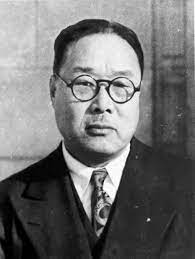
Yi Yun-young was an independence activist, educator, and Methodist minister during the Japanese occupation of Korea. His family clan originated in Danyang, and he was from Yongbyon in Pyonganbuk-do. His art name was Baeksa. During the March 1st Independence Movement, he was arrested for holding a lecture declaring independence and protesting against the Japanese occupation. In 1940, his pastoral qualifications were suspended because he opposed the unification of the churches in Korea and Japan and refused to adapt Sōshi-kaimei. After the Liberation, he participated with Cho Man-sik in the Committee for the Preparation of Korean Independence, founded the Korean Democratic Party, and was active as the party's vice leader. After his escape to the South, he was recommended as acting Prime Minister. After the establishment of Korea's government, he was named to be the first prime minister, but he was defeated because of the rejection of his confirmation by the Korea Democratic Party. After that, he was named to be the prime minister three more times, but each time he was rejected. Being one of Syngman Rhee's closest allies, he served as Minister without Portfolio and Minister of Social Affairs during the First Republic. He ran for vice president representing the anti-Lee Ki-poong faction but was defeated. After the May 16th Coup, he was Chairman of the Committee for Struggle against the prolongation of Military Government and executive member of the People's Party. He was an aide of Cho Man-sik, then after he defected to the South, he worked as an aide to Syngman Rhee.
Choi Jae-cheon is an attorney and a politician in South Korea. He was elected a member of the National Assembly from Seongdong-gu, Seoul in 2004 and was a member of the Democratic Party (Uridang) from 2004 to 2008.
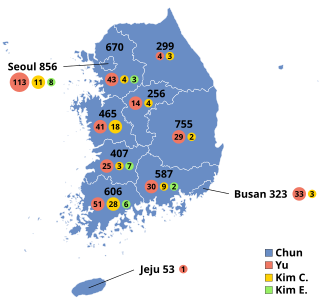
Two-stage presidential elections were held in South Korea in February 1981. An electoral college was elected on 11 February, which in turn elected the president on 25 February. They were the last indirect presidential elections controlled by the government of Chun Doo-hwan under the new 1980 constitution. Chun was re-elected with 90% of the electoral college vote.
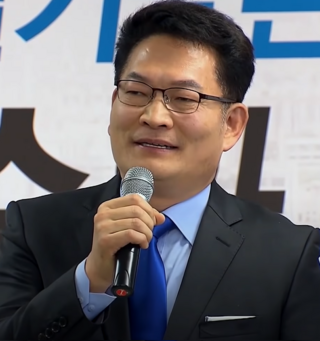
Song Young-gil is a South Korean politician who served as the Leader of the centre-liberal Democratic Party from 2 May 2021 until 10 March 2022. He was Member of the National Assembly, as well as the Chairman of the Foreign Affairs and Unification Committee of the 21st National Assembly. He also held various positions such as the Chair of the Democratic Party's Special Committee on Peace and Cooperation in Northeast Asia and as the Chair of the Presidential Committee on Northern Economic Cooperation. He previously served as Mayor of Incheon from 2010 to 2014. Prior to serving as mayor, he was a democratic movement student activist and a member of the Korean National Assembly for three terms. He is a practicing Catholic.

Yi Cheol-seung was a South Korean politician who served in the National Assembly for seven terms.

Early presidential elections were held in South Korea on 9 May 2017 following the impeachment and removal of Park Geun-hye. The elections were conducted in a single round, on a first-past-the-post basis, and had originally been scheduled for 20 December 2017. However, they were brought forward after the decision of the Constitutional Court on 10 March 2017 to uphold the National Assembly's impeachment of Park. Following procedures set out in the Constitution of South Korea, Prime Minister Hwang Kyo-ahn succeeded Park as the acting president. After Park was removed from office by the Constitutional Court's ruling, acting president Hwang announced he would not run for a term in his own right.

Lyuh Woon-hyung or Yo Un-hyung was a Korean politician who argued that Korean independence was essential to world peace, and a reunification activist who struggled for the independent reunification of Korea following its national division in 1945.

In August 2013, South Korea's spy agency, the National Intelligence Service (NIS), accused Lee Seok-ki, a lawmaker from the leftist Unified Progressive Party (UPP), of plotting to overthrow the country's government if war broke out with North Korea. He was alleged by NIS to have led a secret meeting in May 2013 of 130 members of his party aimed at attacking South Korean infrastructure if the heightened tensions between Koreas in the spring of 2013 had led to war.

Ahn Hee-jung, also known as An Hee-jung, is a former South Korean politician and convicted felon. He served as the 36th and 37th Governor of South Chungcheong Province. He stepped down from his role as governor and announced his retirement from public life after acknowledging accusations that he sexually assaulted his aide Kim Ji-eun on multiple occasions. In February 2019, he was sentenced to a three and a half year prison term for sexual assault.

Choung Byoung-gug is a South Korean politician and the former Minister of Culture, Sports and Tourism. He was the leader of the centre-right Bareunmirae Party, and Chairman of the Special Committee on the 4th Industrial Revolution of the National Assembly of the Republic of Korea.
Chun Jung-bae is a South Korean politician who was the joint chairman of the People's Party, alongside Ahn Cheol-soo. He is a member of the National Assembly for Seo District in Gwangju since 2015, having previously represented Ansan from 1996 to 2012. He served as Minister of Justice from 2005 to 2006 under President Roh Moo-hyun.
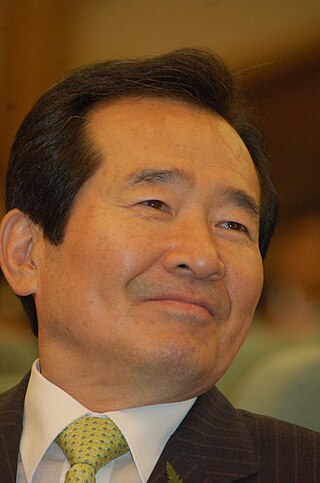
Chung Sye-kyun is a South Korean politician who has served as Speaker of the National Assembly from 2016 to 2018 and Prime Minister of South Korea from 2020 to 2021.

Woo Won-shik is a South Korean politician in the liberal Democratic Party of Korea, who has been a member of the National Assembly for Nowon, Seoul, since 2012. He previously represented the same constituency between 2004 and 2008.

Kim Han-jung is a South Korean politician serving as a member of the Democratic Party of Korea in the 20th and 21st National Assembly
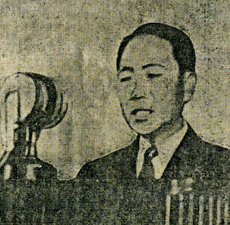
Yi Sung-yop was a communist activist during the Japanese occupation of Korea and a politician during the early years of the Democratic People's Republic of Korea.

Paek Nam-un was an economist, educator and politician during the Japanese colonial period and following the establishment of the Democratic People's Republic of Korea. He was a professor of economics at Yeonhee College and an economic theorist of the Communist Party of Korea, and a representative figure of socialist economists during the Japanese colonial period along with Lee Soon-Tak. After the independence, on the premise of some asset class and solidarity, in the article 'The Path of the Chosun People's', 'Combination of New Democracy ' was proposed. After liberation, Kim Doo-bong, Heo Jeong-suk, and Choi Chang-ik connected with Nam Joseon New Democratic Party and Nationalist Democratic Front, but did not come down after coming to North Korea with Kim Gu, Kim Kyu-sik, Jang Geon-sang in April 1948. Since then, he served as the first literary statue of the Democratic People's Republic of Korea and the chairman of the Supreme People's Assembly.
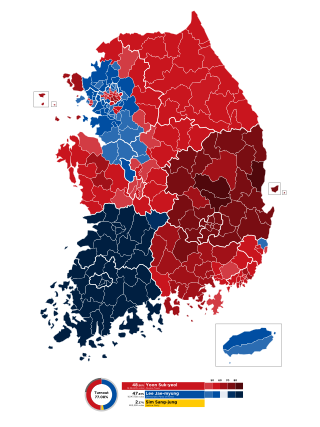
Presidential elections were held in South Korea on 9 March 2022. Under the South Korean constitution, presidents are restricted to a single five-year term, meaning that incumbent president Moon Jae-in was ineligible to run for a second term. Opposition candidate Yoon Suk Yeol of the People Power Party won the election, defeating candidate Lee Jae-myung of the incumbent Democratic Party.


















